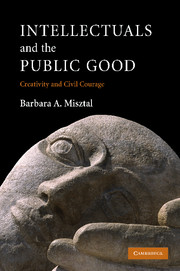Book contents
- Frontmatter
- Contents
- List of tables
- Acknowledgements
- Introduction
- Part I Theoretical framework
- 1 The authority of public intellectuals
- 2 Creativity: the problem of the new
- 3 Courage: acting on conviction
- 4 Typology of engagements
- Part II Public intellectuals: the case of the Nobel Peace Prize laureates
- Conclusion
- References
- Index
3 - Courage: acting on conviction
Published online by Cambridge University Press: 22 September 2009
- Frontmatter
- Contents
- List of tables
- Acknowledgements
- Introduction
- Part I Theoretical framework
- 1 The authority of public intellectuals
- 2 Creativity: the problem of the new
- 3 Courage: acting on conviction
- 4 Typology of engagements
- Part II Public intellectuals: the case of the Nobel Peace Prize laureates
- Conclusion
- References
- Index
Summary
The changing nature and status of courage
In this chapter I discuss what the social sciences, in general, can tell us about the complex phenomenon of courage, and look for answers to these questions: what is courage? Does courage require a particular knowledge or belief component? What are the relationships between courage, risk and difficulty, courage and loyalty to the group and courage and nonconformity?
The notion of courage, which – alongside love – is the most popular topic in world literature (Miller 2000: 8), is still commonly discussed in terms derived from the Greeks, for whom courage was one of the most important virtues. Our contemporary understanding of this notion comes from Plato's and Aristotle's analyses of courage as virtue, while Socrates, a historical exemplar of someone risking death for his beliefs, is seen as the epitome of intellectual and personal courage. The argument that the flourishing of democratic values is associated with the cultivation of courage also goes back to classical Greek democracy, where the courage to speak up (parrhesia, or an act of truth-telling that involves risk) was an essential element of the functioning of democracy (Rossbach 1999: 3–4). As Arendt (1958: 186) notes, courage was the main political virtue, and only ‘that man who possessed it could be admitted to a fellowship that was political in content and purpose and thereby transcend the mere togetherness imposed on all – slaves, barbarians and Greeks alike’.
- Type
- Chapter
- Information
- Intellectuals and the Public GoodCreativity and Civil Courage, pp. 65 - 87Publisher: Cambridge University PressPrint publication year: 2007



